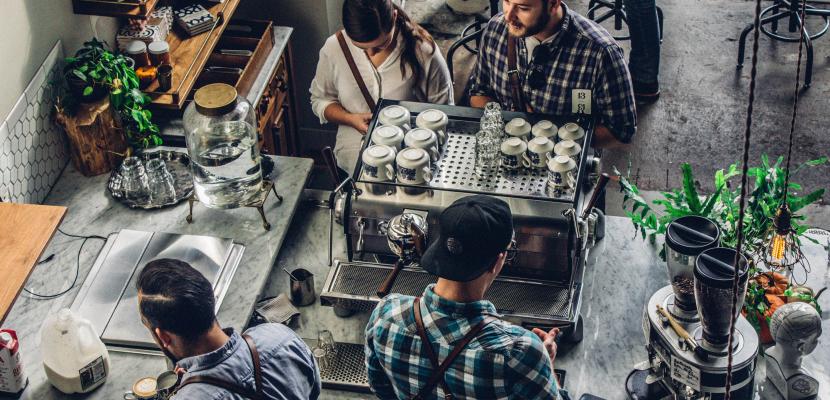Image

Agri-food Circular Systems: the Future Food Institute Ecosystem. Education, Community, Innovation.
Published on 15 December 2020

Italy
This is the good practice's implementation level. It can be national, regional or local.
About this good practice
Silos thinking and short-termism have for long pervaded the agri-food system, generating the excesses and malfunctionings we all know today. Rethinking the whole food supply chain through the lenses of sustainability means at first build bridges of dialogue and cross-pollination among all the players, opening towards new forms of collaborations: multidimensional, multicultural, intergenerational “co-opetitions”.
To implement new regenerative agri-food system models, the Future Food Institute (FFI) operates by connecting the dots of the global food ecosystem. Through Education, its first pillar, it contributes to raise awareness and build a new mindset at different levels: secondary and middle school students (ConviviumLab, KidsLab K12), food actors and today’s global citizens (Food Innovation Program, Boot Camp on Smart Kitchens); the global society (Research Initiative on Food Loss&Waste).
Through events and hackathons developed in its Living Labs, the Institute inspires, connects and feeds the Global Community to take collective actions (Waste2Value Hackathon, Hack Waste Rome, Hack for SDGs, Chockothon, Voices of Food Systems Live Marathon, Food for Earth Day event, Zero Waste Global Convivium digital event).
Through innovation, its third pillar, the FFI contributes finding solutions to multi-corporate challenges through research, new product development, fast prototyping Testing&Validation (Waste2Value, SmartRipe, The Wise Kitchen, FoodAlchemist Team, fermentation bar).
To implement new regenerative agri-food system models, the Future Food Institute (FFI) operates by connecting the dots of the global food ecosystem. Through Education, its first pillar, it contributes to raise awareness and build a new mindset at different levels: secondary and middle school students (ConviviumLab, KidsLab K12), food actors and today’s global citizens (Food Innovation Program, Boot Camp on Smart Kitchens); the global society (Research Initiative on Food Loss&Waste).
Through events and hackathons developed in its Living Labs, the Institute inspires, connects and feeds the Global Community to take collective actions (Waste2Value Hackathon, Hack Waste Rome, Hack for SDGs, Chockothon, Voices of Food Systems Live Marathon, Food for Earth Day event, Zero Waste Global Convivium digital event).
Through innovation, its third pillar, the FFI contributes finding solutions to multi-corporate challenges through research, new product development, fast prototyping Testing&Validation (Waste2Value, SmartRipe, The Wise Kitchen, FoodAlchemist Team, fermentation bar).
Expert opinion
The Future Food Institute Ecosystem is a good example of innovative approaches to a holistic approach to innovation, integrating all actors of the quadruple helix: policy, research and education, industry and society. It applies the principle of open innovation and co-creation on a large scale and aims at impacting both the for-profit and the non-for-profit economy.
The practice goes thereby beyond a sector-based approach to innovation and thinking, addressing societal challenges of global relevance.
The practice goes thereby beyond a sector-based approach to innovation and thinking, addressing societal challenges of global relevance.
Works at
Interreg Europe Policy Learning Platform
Resources needed
Infrastructure: renting costs for the physical spaces.
Human Resources: a general coordinator, an innovation manager, a communication manager and project managers.
General costs: for functioning, communication, travels, consumables etc.
Costs vary according to the local context and structure.
Human Resources: a general coordinator, an innovation manager, a communication manager and project managers.
General costs: for functioning, communication, travels, consumables etc.
Costs vary according to the local context and structure.
Evidence of success
For educational programs FFI has developed a pioneering tool to measure the impact generated (3D measuring the width, length and depth of the impact). Its hackathons on circularity have reached over 400 participants including students, startuppers, businesses and institutional partners. The only Italian-based Living Lab hosted more than 30,000 people, developed nearly 25,000 innovative recipes to embrace circular economy principles and fight climate change, and helped more than 20 startups.
Potential for learning or transfer
FFI already operates in three different continents: Europe (Italy), America (San Francisco and New York City) and Asia (Tokyo, Shanghai, and Singapore). However, the principle behind the practice still remains the same: combining “thinkers” and “doers”, youths and experienced leaders, for-profit and not for profit organisations to co-design and reshape a purpose-driven and regenerative ecosystem starting from the healing power of food. This structure has the mission of breaking the silos of food systems, using a systemic thinking and holistic approach to build a thriving society through food. Increasing awareness and empowering individuals to become conscious beings is the core of a systemic change, just as involving all stakeholders around the table, both within the agri-food sector (food production, transformation, distribution, storage, supply) and outside it (teachers, students, entrepreneurs, startuppers, philanthropists, community builders, researchers, diplomats, changemakers).
Further information
Website
Good practice owner
You can contact the good practice owner below for more detailed information.
Organisation
Future Food Institute

Italy
Emilia-Romagna
Contact
Eu project manager
